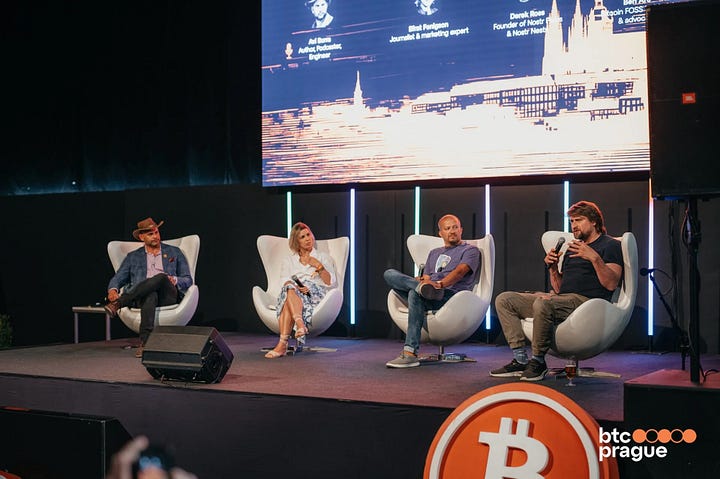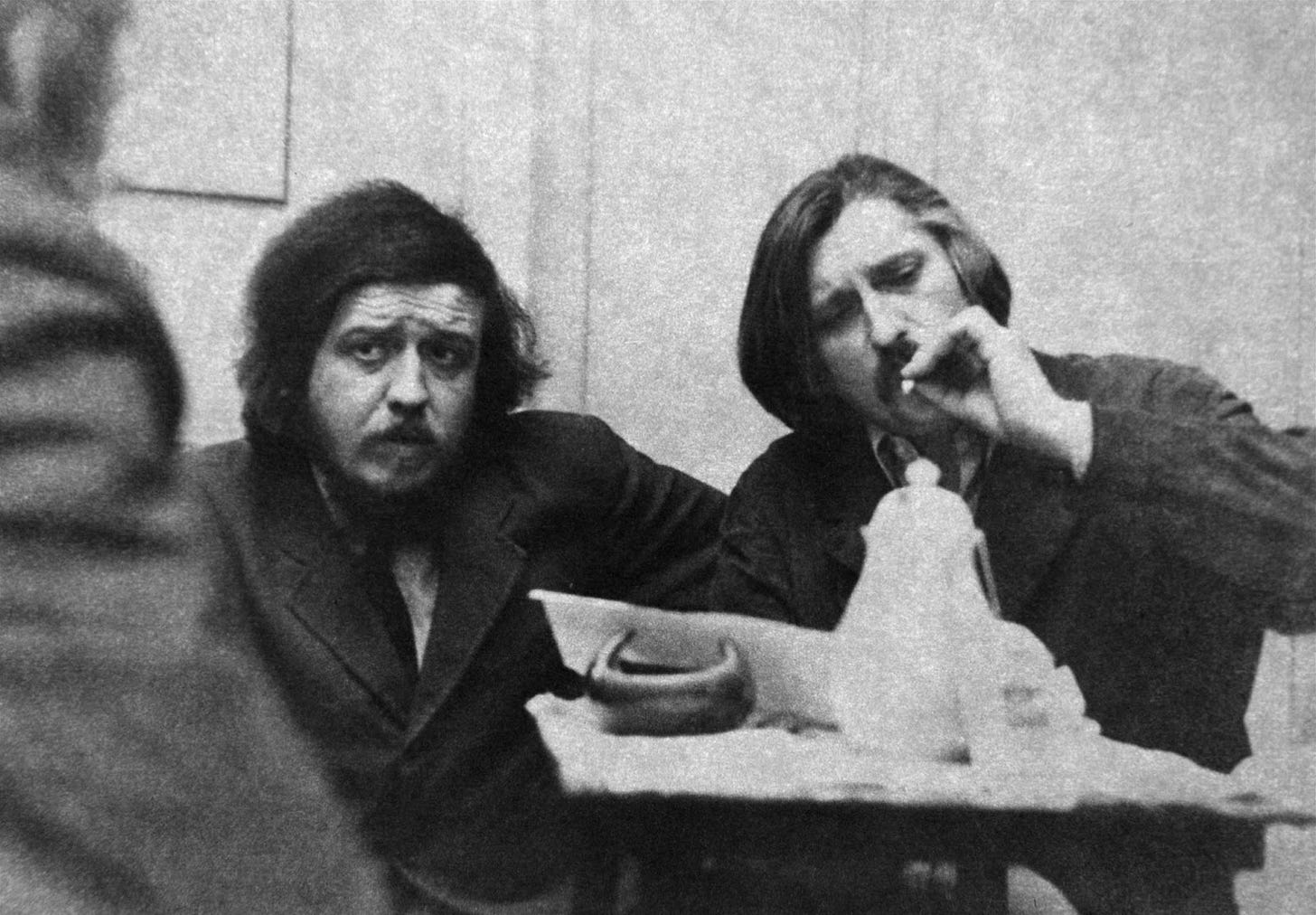A 600-Year Fight for Freedom & the Rise of Prague's Bitcoin Ecosystem
This new, free, e-book is a must-read for anyone who values individual liberty and is curious to explore a legacy of defiance that started 600 years ago and is still unfolding today.
As my subscribers will be well aware, I love Prague, and in particular, BTC Prague, Europe's biggest Bitcoin & Freedom conference, taking place in June. It’s where I gave my keynote speech about the dangers of CBDCs in 2024, and it's also where I did my epic interview with Michael Saylor. This year I’ll give a keynote again, and moderate panels - can’t reveal the secret topics/speakers yet but it’s going to be fascinating!


But those who haven't attended the conference yet, might not know about the Czechs’ history of standing up against tyranny. It actually dates back to the Middle Ages and is directly linked to Prague's current vibrant Bitcoin ecosystem. The conference organizers recently published a wonderful e-book that details this history, called “From Defenestrations to Bitcoin: A 600-Year Fight for Freedom". Let me give you a sneak preview into this fascinating history.
The e-book shows the Czech people’s enduring resistance against tyranny and serves as a poignant lens through which we understand the complex journey toward liberty. The narrative begins with defiant acts in the medieval streets of Prague and culminates in the rise of the Bitcoin ecosystem in the very same city—where a history of resistance is finding new expression in the digital realm.
For those who believe in the power of decentralization and self-sovereignty, this story of the Czech Republic’s remarkable role in these movements is more than historical—it is a blueprint for understanding how we are fighting for our freedom today.
“The battle for sovereignty is far from over. In truth, a new age is just beginning and the struggle will touch us all. The digital era has simply drawn new battle lines, but, once again, the Czech people are leading the charge”
A taste of “what the hell is defenestration” - in this short beautiful clip:
A Legacy of Resistance: The Defenestrations of Prague
The Czech people have long had a unique relationship with rebellion against centralized power, and nothing exemplifies this better than the defenestrations of Prague. The term "defenestration" literally means the act of throwing someone out of a window. The first recorded defenestration occurred in 1419, when Hussite supporters, enraged by the Catholic Church’s refusal to allow religious reforms, threw city officials out of a window. The defenestration sparked the Hussite Wars, which were a direct challenge to the power of both the Catholic Church and the monarchy. It was a fight not just over religious beliefs but also about the autonomy of the Czech people to govern their own destiny.
This tradition of defenestration continued in 1618, with the second defenestration, a pivotal moment that ignited the Thirty Years' War. Once again, it was a rebellion against an overbearing centralized power—the Habsburgs, who were attempting to impose Catholicism on a largely Protestant Bohemia. In both cases, the defenestrations were powerful symbols of a resistance movement that sought to challenge authoritarian rule.
These early uprisings set the stage for a deep-rooted culture of defiance in the Czech Republic, where the struggle for freedom was often as much about physical resistance as it was about ideological and philosophical challenges to authoritarianism.
The Communist Era: Crushing of Freedoms and the Road to Revolution
Fast-forward several centuries, and the Czech struggle for freedom takes another significant turn during the 20th century. After World War II, Czechoslovakia fell under Soviet influence, and the Communist Party took control of the country in 1948. The people of Czechoslovakia, however, were not passive in the face of this new form of oppression.
One of the most notable moments in the Czech struggle against Soviet-backed Communism came in 1968 with the Prague Spring. Led by Alexander Dubček, the Prague Spring sought to create "socialism with a human face," aiming to introduce political and cultural reforms within the Communist framework. However, the Soviet Union and its allies viewed these reforms as a direct threat to their power, and they intervened militarily, crushing the movement.
Despite the Soviet-led crackdown, the desire for political reform never disappeared, and the spirit of resistance lived on. In the following decades, dissident movements, such as Charter 77, emerged as calls for human rights and democratic reforms grew louder. These underground movements highlighted the resilience of the Czech people and their refusal to submit to authoritarian rule.
Ultimately, the Communist era came to an end in 1989 with the Velvet Revolution, a peaceful uprising that saw the resignation of the Communist leadership and the rise of Václav Havel, a key figure in the dissident movement, as the country's new president. This nonviolent revolution demonstrated the power of collective action and marked the end of over four decades of Communist rule in Czechoslovakia.
The Digital Age: A New Era of Defiance in Prague
Just as past generations of Czechs used the tools available to them to resist tyranny, today’s Czechs are leading a new form of rebellion—one that takes place in the digital realm. From Defenestrations to Bitcoin takes us into the heart of Prague’s role in the rise of the Bitcoin movement, which, much like the past revolutions, is centered around personal freedom and autonomy.
Bitcoin’s rise represents the latest chapter in a long history of Czech resistance against centralized control. Emerging out of the 2008 financial crisis, Bitcoin offered a radical alternative to the traditional financial system, a system that many viewed as corrupt and controlled by powerful elites. Bitcoin, created by the pseudonymous Satoshi Nakamoto, is a decentralized digital currency that operates on a peer-to-peer network, free from the control of central banks and governments. This ability to transcend national borders and defy traditional financial systems made Bitcoin an ideal tool for those who value personal sovereignty.
In Prague, the birthplace of many pivotal moments in Czech history, Bitcoin quickly found a receptive audience. The city became a hub for Bitcoin innovation, with the establishment of Bitcoin-related businesses and a growing culture of crypto-anarchy.
The Cultural and Philosophical Roots of Prague’s Bitcoin Ecosystem
The Czech Bitcoin ecosystem is not just about technology; it is deeply tied to the country's rich history of resistance and the philosophical underpinnings of freedom. Much like the revolutionary movements that have shaped Czech history, Bitcoin represents a tool for individuals to break free from the control of centralized entities—whether those entities are political regimes, financial institutions, or corporations.
The ideas of Václav Benda, a key intellectual figure in the Communist era, resonate strongly with the Bitcoin movement. Benda’s concept of the Parallel Polis, a parallel society that operates outside the control of the state, aligns perfectly with Bitcoin’s philosophy. The idea was to build a community that functions independently from the oppressive structures imposed by the Communist regime. In today’s context, this idea is brought to life through decentralized technologies, such as Nostr and Bitcoin, which offer the means to create an alternative social and financial system that operates outside traditional Big Tech, banking and government control.
Just as the defenestrations of Prague symbolized a direct physical challenge to entrenched power, Bitcoin challenges the financial system that many view as oppressive. It empowers individuals by giving them control over their financial transactions and wealth, without the need for intermediaries. This is the modern iteration of the Czech tradition of resistance—a movement that seeks to reclaim personal sovereignty in the face of external control.
Join the Movement
With the European Union pushing forward to launch their CBDC, which I've communicated about extensively, the Czech Republic and other European countries face new challenges to individual freedoms. Going forward, being part of a global movement that is not only willing to fight for our freedoms, but also builds the tools we need to come out on top will be more important than ever. And there is no place where you can feel part of such a movement like Prague.
To get a taste of its rich history, I highly recommend you download and read the free e-book “From Defenestrations to Bitcoin: A 600-Year Fight for Freedom" for yourself. The richly illustrated book is full of amazing stories that any freedom maxi will love.
And of course, the ultimate way to connect with Prague's freedom and Bitcoin space is to head there in June to attend BTC Prague together with me and thousands of other freedom lovers and Bitcoiners. Click HERE to get your tickets with a 10% discount.
Thanks for reading and downloading the e-book!
Hope to see you in Prague.
♥️ Efrat
Follow me:
Twitter | Telegram | YouTube | Instagram | My podcast | All other links
► New: Watch “New Totalitarian Order”
With Prof. Mattias Desmet - Full 3 hours conference + bonus content!
Sponsors:
►► Get your TREZOR wallet & accessories, with a 5% discount, using my code at checkout (get my discount code from the latest episode - yep, you’ll have to watch it)














